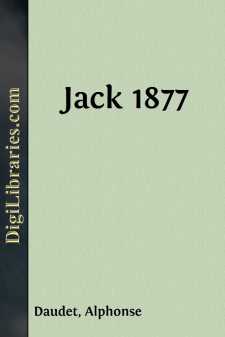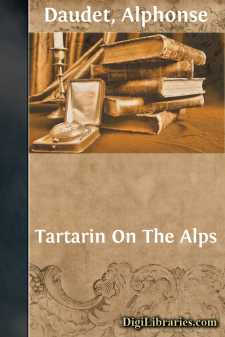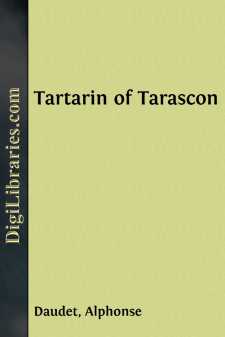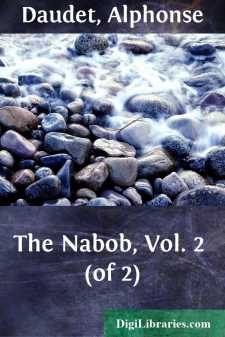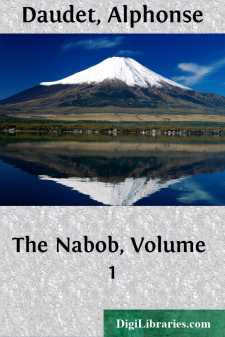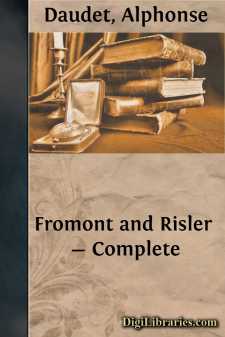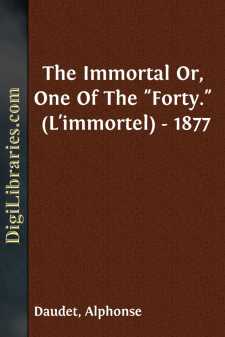Categories
- Antiques & Collectibles 13
- Architecture 36
- Art 48
- Bibles 22
- Biography & Autobiography 813
- Body, Mind & Spirit 142
- Business & Economics 28
- Children's Books 15
- Children's Fiction 12
- Computers 4
- Cooking 94
- Crafts & Hobbies 4
- Drama 346
- Education 46
- Family & Relationships 57
- Fiction 11828
- Games 19
- Gardening 17
- Health & Fitness 34
- History 1377
- House & Home 1
- Humor 147
- Juvenile Fiction 1873
- Juvenile Nonfiction 202
- Language Arts & Disciplines 88
- Law 16
- Literary Collections 686
- Literary Criticism 179
- Mathematics 13
- Medical 41
- Music 40
- Nature 179
- Non-Classifiable 1768
- Performing Arts 7
- Periodicals 1453
- Philosophy 64
- Photography 2
- Poetry 896
- Political Science 203
- Psychology 42
- Reference 154
- Religion 513
- Science 126
- Self-Help 84
- Social Science 81
- Sports & Recreation 34
- Study Aids 3
- Technology & Engineering 59
- Transportation 23
- Travel 463
- True Crime 29
Alphonse Daudet
Alphonse Daudet was a renowned French novelist and playwright, best known for his vivid portrayal of Provençal life and his masterful storytelling. Born on May 13, 1840, in Nîmes, France, Daudet gained fame with works such as "Lettres de mon moulin" (Letters from My Windmill) and the novel "Tartarin de Tarascon." His writing is celebrated for its wit, charm, and keen observation of human nature, reflecting the influences of his Provençal roots and his experiences in Parisian literary circles.
Author's Books:
Sort by:
by:
Alphonse Daudet
CHAPTER I.~~VAURIGARD. "With a k, sir; with a k. The name is written and pronounced as in English. The child's godfather was English. A major-general in the Indian army. Lord Pembroke. You know him, perhaps? A man of distinction and of the highest connections. But—you understand—M. l'Abbé! How deliciously he danced! He died a frightful death at Singapore some years since, in a...
more...
by:
Alphonse Daudet
INTRODUCTION Alphonse Daudet was born at Nîmes on May 13, 1840. The Daudets were of lowly origin. Alphonse’s grandfather, a simple peasant, had in 1789 settled at Nîmes as a weaver. His business prospered so much that he died leaving a small fortune; Vincent Daudet, his fourth son, and a young man of great ambition, was determined to rise out of the class in which he was born and acquire for...
more...
by:
Alphonse Daudet
TARTARIN ON THE ALPS. I. Apparition on the Rigi-Kulm. Who is it? What was said arounda table of six hundred covers. Rice and Prunes, Animprovised ball. The Unknown signs his name on the hotelregister, P. C. A. On the 10th of August, 1880, at that fabled hour of the setting sun so vaunted by the guide-books Joanne and Baedeker, an hermetic yellow fog, complicated with a flurry of snow in white spirals,...
more...
by:
Alphonse Daudet
EPISODE THE FIRST, IN TARASCON I. The Garden Round the Giant Trees. MY first visit to Tartarin of Tarascon has remained a never-to-be-forgotten date in my life; although quite ten or a dozen years ago, I remember it better than yesterday. At that time the intrepid Tartarin lived in the third house on the left as the town begins, on the Avignon road. A pretty little villa in the local style, with a...
more...
by:
Alphonse Daudet
A DAY OF SPLEEN. Five o'clock in the afternoon. Rain ever since the morning, a gray sky, so low that one can touch it with one's umbrella, dirty weather, puddles, mud, nothing but mud, in thick pools, in gleaming streaks along the edge of the sidewalks, driven back in vain by automatic sweepers, sweepers with handkerchiefs tied over their heads, and carted away on enormous tumbrils which...
more...
by:
Alphonse Daudet
ALPHONSE DAUDET. Alphonse Daudet is one of the most richly gifted of modern French novelists and one of the most artistic; he is perhaps the most delightful; and he is certainly the most fortunate. In his own country earlier than any of his contemporaries he saw his stories attain to the very wide circulation that brings both celebrity and wealth. Beyond the borders of his own language he swiftly won a...
more...
by:
Alphonse Daudet
ALPHONSE DAUDET Nominally Daudet, with the Goncourts and Zola, formed a trio representing Naturalism in fiction. He adopted the watchwords of that school, and by private friendship, no less than by a common profession of faith, was one of them. But the students of the future, while recognizing an obvious affinity between the other two, may be puzzled to find Daudet's name conjoined with theirs....
more...
by:
Alphonse Daudet
CHAPTER I. In the 1880 edition of Men of the Day, under the heading Astier-Réhu, may be read the following notice:— Astier, commonly called Astier-Réhu (Pierre Alexandre Léonard), Member of the Académie Française, was born in 1816 at Sauvagnat (Puy-de-Dôme). His parents belonged to the class of small farmers. He displayed from his earliest years a remarkable aptitude for the study of history....
more...


